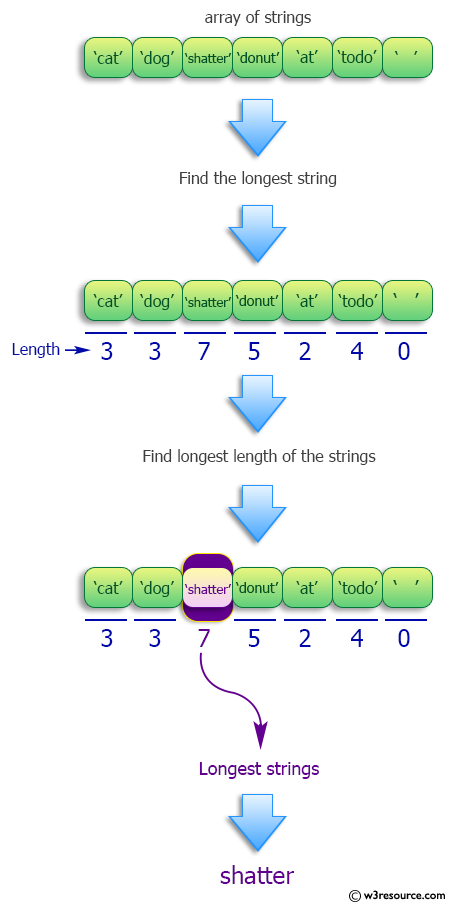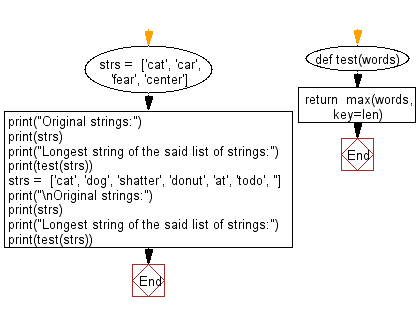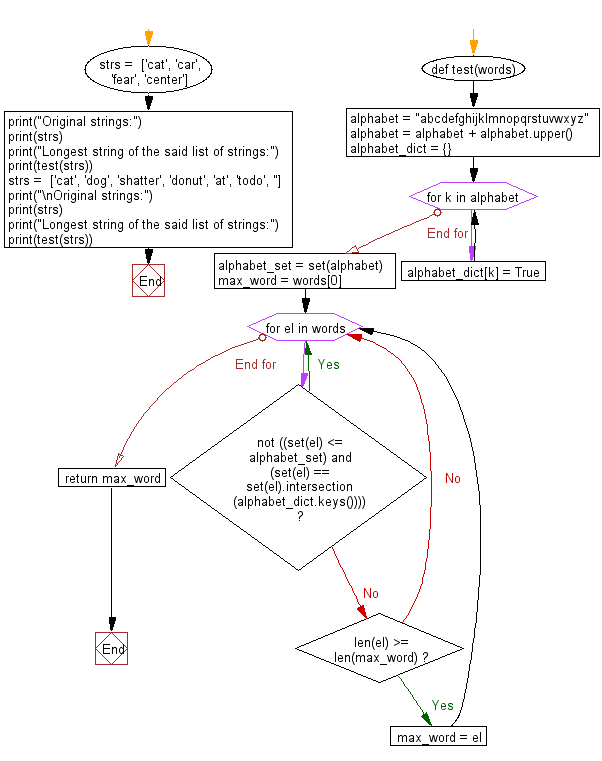Python: Find the longest string of a list of strings
Longest String in List
Write a Python program to find the longest string in a given list of strings.
Input: ['cat', 'car', 'fear', 'center'] Output: center Input: ['cat', 'dog', 'shatter', 'donut', 'at', 'todo', ''] Output: shatter
Visual Presentation:

Sample Solution-1:
Python Code:
# Define a function named 'test' that takes a list of strings 'words' as input
def test(words):
# Use the max function to find the string with the maximum length in 'words' based on the key=len (length of each string)
return max(words, key=len)
# Create a list of strings 'strs' with specific elements
strs = ['cat', 'car', 'fear', 'center']
# Print the original list of strings
print("Original strings:")
print(strs)
# Print a message indicating the operation to be performed on the list
print("Longest string of the said list of strings:")
# Print the result of the test function applied to the 'strs' list
print(test(strs))
# Create a different list of strings 'strs' with specific elements
strs = ['cat', 'dog', 'shatter', 'donut', 'at', 'todo', '']
# Print the original list of strings
print("\nOriginal strings:")
print(strs)
# Print a message indicating the operation to be performed on the list
print("Longest string of the said list of strings:")
# Print the result of the test function applied to the modified 'strs' list
print(test(strs))
Sample Output:
Original strings: ['cat', 'car', 'fear', 'center'] Longest string of the said list of strings: center Original strings: ['cat', 'dog', 'shatter', 'donut', 'at', 'todo', ''] Longest string of the said list of strings: shatter
Flowchart:

Sample Solution-2:
Python Code:
# License: https://bit.ly/3oLErEI
# Define a function named 'test' that takes a list of strings 'words' as input
def test(words):
# Define the lowercase and uppercase alphabet characters
alphabet = "abcdefghijklmnopqrstuvwxyz"
alphabet = alphabet + alphabet.upper()
# Initialize an empty dictionary 'alphabet_dict' to store True for each alphabet character
alphabet_dict = {}
# Populate the 'alphabet_dict' with True for each alphabet character
for k in alphabet:
alphabet_dict[k] = True
# Create a set 'alphabet_set' containing all alphabet characters
alphabet_set = set(alphabet)
# Initialize 'max_word' with the first word in the list
max_word = words[0]
# Iterate through each element 'el' in the list 'words'
for el in words:
# Check if 'el' contains only alphabet characters and is a subset of 'alphabet_set'
# Also, check if it has the same set of characters as its intersection with 'alphabet_dict.keys()'
if not ((set(el) <= alphabet_set) and (set(el) == set(el).intersection(alphabet_dict.keys()))):
continue
# Check if the length of 'el' is greater than or equal to the length of 'max_word'
if len(el) >= len(max_word):
# Update 'max_word' if the length condition is met
max_word = el
# Return the longest valid word
return max_word
# Create a list of strings 'strs' with specific elements
strs = ['cat', 'car', 'fear', 'center']
# Print the original list of strings
print("Original strings:")
print(strs)
# Print a message indicating the operation to be performed on the list
print("Longest string of the said list of strings:")
# Print the result of the test function applied to the 'strs' list
print(test(strs))
# Create a different list of strings 'strs' with specific elements
strs = ['cat', 'dog', 'shatter', 'donut', 'at', 'todo', '']
# Print the original list of strings
print("\nOriginal strings:")
print(strs)
# Print a message indicating the operation to be performed on the list
print("Longest string of the said list of strings:")
# Print the result of the test function applied to the modified 'strs' list
print(test(strs))
Sample Output:
Original strings: ['cat', 'car', 'fear', 'center'] Longest string of the said list of strings: center Original strings: ['cat', 'dog', 'shatter', 'donut', 'at', 'todo', ''] Longest string of the said list of strings: shatter
Flowchart:

For more Practice: Solve these Related Problems:
- Write a Python program to find and return the longest string from a list using the max() function with a custom key.
- Write a Python program to iterate through a list of strings and determine which has the maximum length.
- Write a Python program to sort a list of strings by length and output the last element as the longest string.
- Write a Python program to use recursion to compare string lengths in a list and return the longest string found.
Go to:
Previous: Find the lengths of a list of non-empty strings.
Next: Find the strings in a list containing a given substring.
Python Code Editor :
Have another way to solve this solution? Contribute your code (and comments) through Disqus.
What is the difficulty level of this exercise?
Test your Programming skills with w3resource's quiz.
